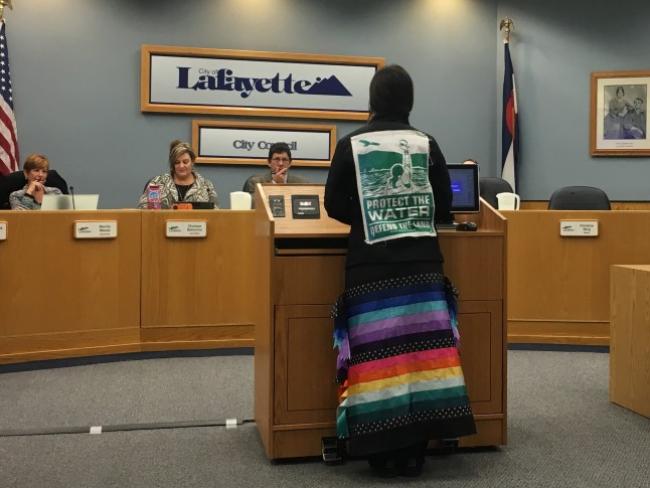Articles Menu

January 05, 2017 Environment/Energy
Lafayette is eyeing a citywide policy that would codify residents’ right to a healthy climate — and to defend that right with civil disobedience.
Part of a larger effort to keep oil and gas development out of Lafayette and Boulder County, the city’s proposed Climate Bill of Rights and Protections introduced this week would protect community members’ ability to take nonviolent direct action against extracting coal, oil and natural gas and other activities they deem as threats to a healthy climate.
The U.S. Constitution protects the rights of free speech and assembly, but acts of civil disobedience can lead to fines and jail time on charges such as trespassing, disorderly conduct or rioting. East Boulder County United, a citizen-led group in support of the measure, has begun holding nonviolent direct-action training seminars across the Front Range.
“Lafayette is the first foothold in the fight against this stuff. It can’t be the last,” Cliff Willmeng, a longtime activist in the fight for control over oil and gas development, said at Lafayette’s city council meeting Tuesday.
Boulder County recently extended its temporary moratorium over fracking to May 1, a timeframe that, as Willmeng sees it, promises “better weather for protesting.”
In the face of ever-narrowing ways to limit or ban drilling activities in residential areas – especially the Colorado Supreme Court’s ruling last year that cities do not have local control over fracking – activists say civil disobedience has become one of their last remaining options.
The measure was introduced at a city council meeting Tuesday by two council members. More than a dozen residents testified, with all but one — an energy company employee — voicing support for the idea. Several in attendance said experiences protesting the Dakota Access Pipeline at Standing Rock in 2016 inspired them to stand up for clean air and water closer to home.
Jud Greenwood, an engineer with Noble Energy, worried that the wording of the proposed ordinance isn’t specific enough about what kinds of activities could be considered harmful to the climate. He suggested that the measure could lead to neighbors protesting neighbors for having propane grills or gas-powered lawnmowers. Proponents, who worked with the Community Environmental Legal Defense Fund to write the Bill of Rights, argued that such an interpretation was unlikely.
Council members were largely supportive of the measure, but some agreed that the language could benefit from some small tweaks. In 2013, when the residents of Lafayette passed a citizen’s bill of rights that sought to offer similar control over oil and gas development, the Colorado Oil and Gas Association quickly filed a lawsuit against the city. Council members are less concerned about facing another lawsuit than about ensuring that the proposed Climate Bill of Rights would offer enforceable protections that would be worth defending in such a suit.
Mayor Pro Tem Gustavo Reyna acknowledged that the council was in “uncharted waters” in considering the proposal, but recalled that civil rights victories of the past were also unprecedented. “This is a historic moment where people are being pinned against their will to accept the denigration of their environment in order to serve someone else’s profits,” he said. “We are finding a way to create a hopeful place.”
The 5-member council, from which two members were absent, voted 4 to 1 to have the city attorney draw up the ordinance for a formal first reading on Jan. 17. That meeting will allow time for public comment as well as discussion of potential amendments to the measure.
If the law passes, Lafayette would become only the third city in the nation to implement such a measure. Two townships in Pennsylvania did so last year over concerns of proposed fracking waste injection wells. Chad Nicholson, a Pennsylvania organizer for the Community Environmental Legal Defense Fund, says that in those townships, as in Lafayette, “resistance is ongoing.”